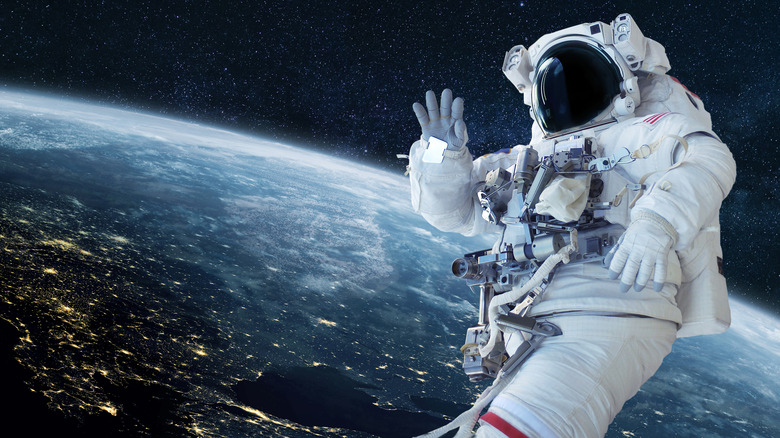
This Is How Long It Would Take To Drive To Space
Currently there is one way, and one way only, to get to space: Get into a vehicle atop a rocket and get launched up there. You can either do that as an employee of a government-funded space agency, or as a tourist aboard a private craft, but either way, the process is going to be time-consuming and expensive. Meanwhile, the space exploration community is hopeful that a space elevator will be operational by the middle of this century, according to NBC News. That technology would significantly reduce the time and cost of delivering various payloads into space.
But what if you could drive there? Of course, the very concept is impossible on multiple levels: roads don’t go straight up, for example, and cars aren’t built to withstand the harsh environment of space. But strictly from a mathematical standpoint, how long would it take to get to space if it were possible at regular highway driving speeds — that is, to drive to the arbitrary boundary that defines the end of the Earth’s atmosphere?
It would take about an hour to drive to space
Driving to space itself would be almost trivial and would barely qualify as an afternoon trip. As astronomer Fred Hoyle explained via Best Life, the boundary between the Earth’s atmosphere and space is an arbitrary one, but is generally considered to be about 60 miles up. From there, the math is easy: driving at 60 miles per hour, you could drive to space in one hour.
Getting to the nearest space “landmark,” so to speak, is going to require a bit more effort. The Moon, according to Science Focus, is roughly 250,000 miles away. That means the trip would take 4,166 hours, or nearly 174 days of driving without stopping.
And finally, and strictly for the sake of reference, there’s Earth’s celestial neighbor to which we’ve been sending spacecraft for decades, with a view toward one day sending a manned mission up there: Mars. The Red Planet is 218.7 million miles away, according to NASA. Driving there at 60 miles per hour, it would take over 3.6 million hours to reach Mars. That’s 151,875 days, or 415 years.

Why William Shakespeare May Have Been Involved In Organized Crime

The Truth About Aristotle's Love Life

How This Florida Man Lost His $30 Million Lotto Winnings

Things We Learned After Watching Bob Ross: Happy Accidents, Betrayal & Greed

The Truth About The Deadly Wanggongchang Explosion

You May Have An Identical Twin You're Not Related To. Here's How

According To The Bible, How Long Was Jonah Inside The Whale?

A Look At Billy Preston's Time Working With The Rolling Stones

The Truth About The Woman Who Saved Anne Frank's Diary

This Was The Part Of Fame Dolores O'Riordan Didn't Like























